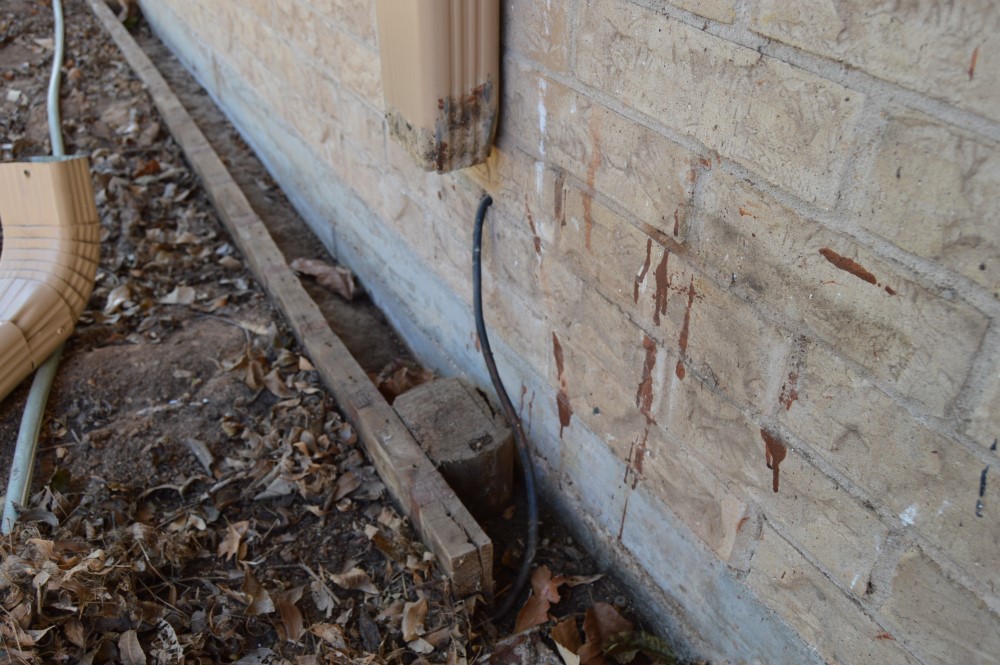▼
Posts: 276
Threads: 0
Joined: Jan 2010
 11-15-2020, 05:30 PM
11-15-2020, 05:30 PM
Folks,
When I moved into the house 30 some odd years ago, I had one 20A circuit in the garage. Since then, I've added an additional 100A in the form of 2 x 20A independent circuits and a 60A subpanel.
Recently, when removing some old decking next to the garage, I observed the following situation (see picture). I have a sneaking suspicion that this is the original 20A circuit, buried underground until it enters the garage as you see in the picture. I don't know of any other outside fixtures that might use the wire, although it is conceivable that one used to exist before I moved in. The garage is attached to the house (and hence the main panel) by a breezeway, and if I had built the house I would have run the garage circuit through this breezeway (ie through the house attic) rather than bury it underground.
Is this likely to be the original circuit? Is there an easy way to tell? (I have electrical testers, but nothing with a clamp on feature).
If you were me, what, if anything, would you do about this situation? Is there some sort of simple conduit retrofit that I could install?
Thanks,
Mark
Mark in Sugar Land, TX
▼
Posts: 1,998
Threads: 1
Joined: Aug 2016
11-15-2020, 05:50 PM
(This post was last modified: 11-15-2020, 05:52 PM by Roly.)
(11-15-2020, 05:30 PM)MarkSLSmith Wrote: Folks,
When I moved into the house 30 some odd years ago, I had one 20A circuit in the garage. Since then, I've added an additional 100A in the form of 2 x 20A independent circuits and a 60A subpanel.
Recently, when removing some old decking next to the garage, I observed the following situation (see picture). I have a sneaking suspicion that this is the original 20A circuit, buried underground until it enters the garage as you see in the picture. I don't know of any other outside fixtures that might use the wire, although it is conceivable that one used to exist before I moved in. The garage is attached to the house (and hence the main panel) by a breezeway, and if I had built the house I would have run the garage circuit through this breezeway (ie through the house attic) rather than bury it underground.
Is this likely to be the original circuit? Is there an easy way to tell? (I have electrical testers, but nothing with a clamp on feature).
If you were me, what, if anything, would you do about this situation? Is there some sort of simple conduit retrofit that I could install?
Thanks,
Mark
Can you see where it is running from inside the house ? Can you see it inside the garage ? if so is it the same type of wire ? Can you test the ends ? A non contact voltage MAY tell you if it is energized. A clamp on meter would not work unless you separate the conductors and then only if it is under load. The wire does not look to be normal wire used for underground. Roly
▼
Posts: 276
Threads: 0
Joined: Jan 2010
(11-15-2020, 05:50 PM)Roly Wrote: Can you see where it is running from inside the house ? Can you see it inside the garage ? if so is it the same type of wire ? Can you test the ends ? A non contact voltage MAY tell you if it is energized. A clamp on meter would not work unless you separate the conductors and then only if it is under load. The wire does not look to be normal wire used for underground. Roly
The inside of the garage is finished, so it would be hard to trace without ripping out some inside wall.
Mark
Mark in Sugar Land, TX
▼
Posts: 276
Threads: 0
Joined: Jan 2010
(11-15-2020, 06:21 PM)MarkSLSmith Wrote: The inside of the garage is finished, so it would be hard to trace without ripping out some inside wall.
Mark
The subpanel is only about 3 years old, so the wire predates it by decades.
Mark
Mark in Sugar Land, TX
Posts: 16,604
Threads: 0
Joined: Oct 2002
Location: Ra-cha-cha, NY
It looks round - could be a grounding electrode conductor, if there’s a separate ground rod(s) there. Since it’s just one building due to the breezeway structure, there doesn’t need to be another electrode, but it might be one anyway. Can’t tell how heavy it is though. Is the sub panel near there?
Could be OTA or cable TV coax, which is also round of course.
That’s all I’ve got.

Tom
“This place smells like that odd combination of flop sweat, hopelessness, aaaand feet"
Posts: 24,145
Threads: 2
Joined: Sep 2003
Location: Missouri
Round...looks like TV cable or antenna cable.
Round electrical is usually automotive wire.
Steve
Mo.
I miss the days of using my dinghy with a girlfriend too. Zack Butler-4/18/24
The Revos apparently are designed to clamp railroad ties and pull together horrifically prepared joints
WaterlooMark 02/9/2020
▼
Posts: 1,998
Threads: 1
Joined: Aug 2016
(11-15-2020, 08:37 PM)Stwood_ Wrote: Round...looks like TV cable or antenna cable.
Round electrical is usually automotive wire.
Round can also be old three conductor cable. Strip the outer jacket and see what is inside. Roly
Posts: 10,776
Threads: 0
Joined: Jul 2005
Location: Front seat on the Struggle Bus
Pull the cover on the main panel, look for the wire there.
Ed
|







